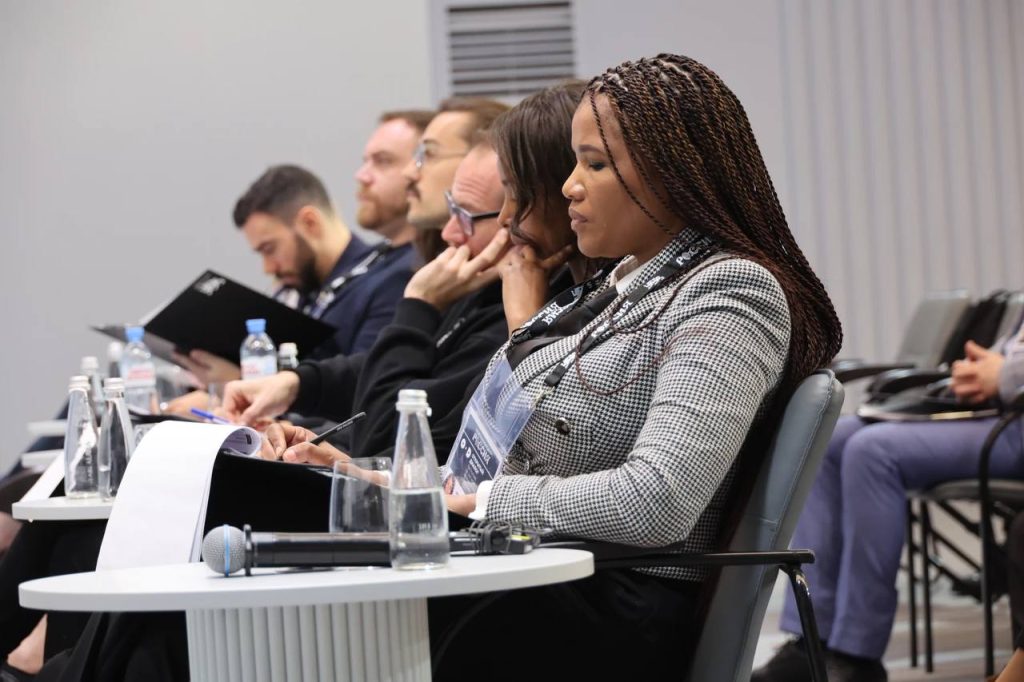The international project Open Dialogue “Future of the World. New Platform for Global Growth” takes place at the National Centre “Russia” from April 28 to 30.
One of the main topics for discussion within this initiative is “Investment in Connectivity,” which attracted 24% of essay authors participating in the project, who are writing about the world’s future. Within this track, a pitch session with world-class experts was held on April 28.
Experts noted the growing interconnection of economies from different countries, which is driven by the development of international trade, transport infrastructure and digital technologies, the growth of information flows, and other factors.
Dialogue participants discussed issues of accelerating economic growth through strategic investments, prospects for expanding international cooperation, and shared their expectations related to the new platform for global growth.
An essayist from Romania, Atudorei Calistrat, Vice President of the European Geopolitical Multipolarity Alliance (EGMA), noted that multipolarity carries a universal value. However, Western society still does not want to recognise this concept.
“We see that Western leaders are trying to do everything to preserve unipolarity, to impose the opinion that the Western model of world existence is the best one.
However, we believe these values are universal, unlike what the Western community imposes on us. Democracy, human rights, freedom — these are our common values. And we see that multipolarity is beneficial because relations between countries develop on equal terms, as it should be between sovereign states. And we already see that, for example, the BRICS organisation is leading countries toward prosperity and well-being,” said Atudorei Calistrat.
During the pilot project presentation to develop communication strategies, essay author, graduate student, and journalist Solomon Gardi (Ethiopia) emphasised the importance of effective information exchange between countries. He also drew attention to the expected high investment return in this area.
“We need to tell the outside world about ourselves. This requires a large-scale multilingual platform that will distribute various types of content in different languages. It is also necessary to train new generations of journalists. Without this, effective communication is impossible.”
“I am convinced that interstate investments in communication infrastructure will bring high returns. Thanks to our pilot project, we will be able to create about 50,000 jobs in the creative economy, get 20% of the media space for the global South, and by 2030 we will share our culture with 500 million viewers. We will also be able to achieve equality without imposing any ideas,” emphasised Solomon Gardi.
Doctor of Economic Sciences, Professor at Complutense University of Madrid, Juan Antonio de Castro de Arespacochaga (Spain), spoke about the significance of Open Dialogue in terms of exchanging new ideas for global growth and building the future.
“During today’s meeting, we found that we have many new, interesting, and very reasonable positions and proposals. The Open Dialogue platform is an excellent chance to promote and implement all these ideas. We must develop together, convey to the general public what is happening in the BRICS countries, and demonstrate what contribution these countries can make to the future of a multipolar world,” said Juan Antonio de Castro de Arespacochaga.
Following the pitch sessions, authors of the best ideas in the “Investment in Connectivity” track were allowed to participate in the panel pitching on the second day of the Open Dialogue on April 29.
The highest evaluation from experts was received by Dr. Philosophy, Assistant Professor at the Department of International Relations at the Federal University of Arts, Science and Technology of Pakistan, Faisal Javaid; co-founder of STRELA, Berki Roland (Hungary); student of Tianjin University of Foreign Languages, Wang Hongyue (China); National Coordinator for Public Relations and Education of the International Astronomical Union, Vera Cervantes Victor Daniel (Peru); Associate Professor of Economics at Lakshmibai College, University of Delhi, Sonkar Suman (India); and economist Potvin Joseph (Canada).
The international project Open Dialogue “Future of the World. New Platform for Global Growth” is being held at the National Centre “Russia” from April 28 to 30, 2025.
It is attended by international experts from leading analytical centres, including 24 world-class experts, development institutes, higher education, government institutions, business associations, youth organisations, science and journalism. The event also brought together authors of the best essays on the world’s future from 42 countries.
The expert council of NC “Russia” selected the works from among 696 essays written in 18 languages.
The Open Dialogue participants represent 48 countries (all continents of the Earth). As part of the NC “Russia” project, they will discuss the development of the world economy in four key areas: “Investment in People,” “Investment in Technologies,” “Investment in Connectivity,” and “Investment in Environment.”
DISCLAIMER: The Views, Comments, Opinions, Contributions and Statements made by Readers and Contributors on this platform do not necessarily represent the views or policy of Multimedia Group Limited.


